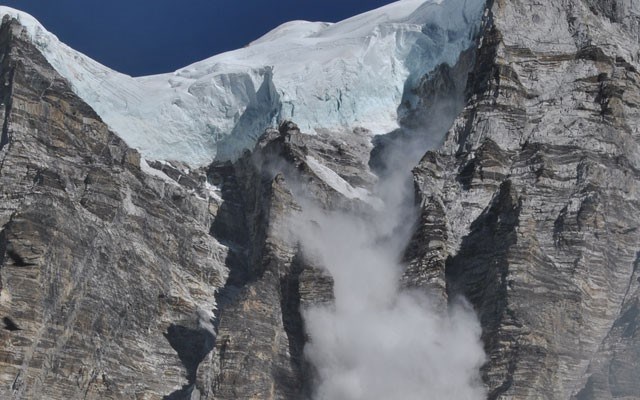The story of summiting the world's highest peak has been told so many times that Sunshine Coast filmmaker Dianne Whelan decided to take a different approach when shooting her award-winning documentary on Mount Everest.
"The film about going to the top has been done about 25 times and I wasn't interested in that," Whelan said during a talk at the Whistler Public Library May 7.
"I was interested in the microcosm of humanity found at Base Camp."
And what Whelan, who cut her teeth in the early '90s as a photographer for the Whistler Question, found while shooting her film in the spring of 2010, 40 Days at Base Camp, was what she described as "a town without a sheriff," a lawless community of seasoned Sherpas, and ambitious climbers from around the globe seeking the ultimate challenge at 5,486 metres.
But last week's talk marking the release of Whelan's latest book, Base Camp: 40 Days on Everest, her personal account of the time she spent on the fearsome Himalayan mountain, was overshadowed by an avalanche less than two weeks prior that claimed the lives of 16 Sherpas.
"As sad as that tragedy is, regrettably it comes as no shock to me," Whelan said. "In my opinion, it wasn't a question of if it was going to happen, but when."
Whelan, who captured the efforts of three separate teams trying to make the summit in her film, said the ongoing "commercialization" of Everest, combined with the harrowing impacts of climate change, are what contributed to the April 18 tragedy.
What was clear to Whelan when making her film, years before the deadliest day in the mountain's history, was that it's the Sherpas who have continually paid the highest price for the rest of the world's unrelenting desire to conquest Everest.
"Back when climbers first arrived at Everest none of (the Sherpas) could read or write ... and had an inordinate amount of respect for the literate foreigners," she said. "Now that Sherpas are starting to get better education, better jobs, they're realizing that that respect is misplaced.
"The days of those romanticized relationships between climber and Sherpa, like (Edmund) Hillary and Tenzing (Norgay) had, are over."
Following the deadly avalanche last month, expeditions up Everest have been crippled, as Sherpas have gone on strike demanding better pay and benefits. Whelan said the average load-hauling Sherpa makes $6 a day, while climbing guides, who accompany expedition teams of varying abilities and experience to the summit — Whelan claims she met people at Base Camp who had never even seen snow before, let alone climbed a mountain — make around $125.
While she had no illusions that the money-making machine of Everest would ever come to a permanent halt — the Nepalese government collects about $3.3 million annually in climbing fees, and considerably more from tourism to the region, after all — she hopes the international community recognizes that it should be the Sherpa people who dictate future activity on the mountain.
"What (the Sherpas) need is for us to say: 'Whatever you guys choose is OK with us.' What they need is self-determination," said Whelan, who added that she wouldn't be surprised if the Sherpa guides unionized in the coming years.
Of course, no discussion about the future of Everest would be complete without discussing the growing impacts of climate change. Whelan, who shot the NFB-produced documentary, This Land, filmed in the Canadian Arctic, said she can't seem to avoid the issue in her work.
"I don't set out to make climate change films, but everywhere I go that's all that people want to talk about," she said. "I just relay the message."
The filmmaker discussed how, like the Inuit she met during the production of This Land, Sherpas have struggled to "read the ice," and assess the inherent danger of the ground beneath them with escalating temperatures in the Himalayas.
Whelan sees the debate over climate change surrounding Everest as a representation of the issue the rest of the world will inevitably have to address at some point.
"What they're dealing with (on Everest) with climate change, it's simply a microcosm of the macrocosm — it's something that we'll all have to face eventually."
For more information about Whelan's film or book, visit her website at www.diannewhelan.com.




